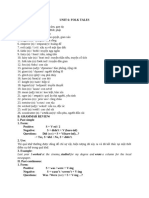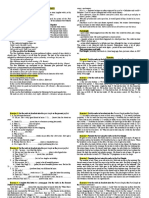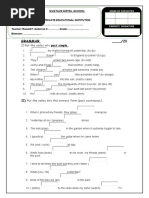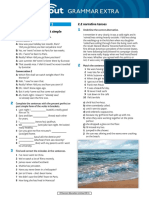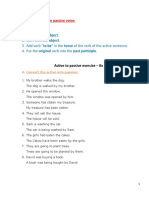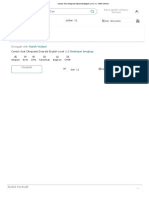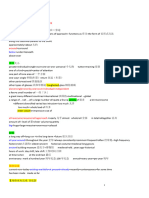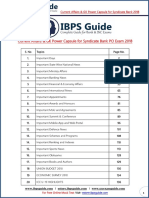PAST TENSES -NOTES AND EXERCISE - QUESTIONS - 2024
PAST TENSES -NOTES AND EXERCISE - QUESTIONS - 2024
Uploaded by
mishalmirza168Copyright:
Available Formats
PAST TENSES -NOTES AND EXERCISE - QUESTIONS - 2024
PAST TENSES -NOTES AND EXERCISE - QUESTIONS - 2024
Uploaded by
mishalmirza168Copyright
Available Formats
Share this document
Did you find this document useful?
Is this content inappropriate?
Copyright:
Available Formats
PAST TENSES -NOTES AND EXERCISE - QUESTIONS - 2024
PAST TENSES -NOTES AND EXERCISE - QUESTIONS - 2024
Uploaded by
mishalmirza168Copyright:
Available Formats
ABU DHABI INDIAN SCHOOL - BRANCH 1, AL WATHBA
TENSES (Notes and Exercise)
Simple Past Tense, Past Continuous Tense and Past Perfect Tense
Simple Past Tense
The simple past tense is used to indicate or describe something that happened or existed in the past.
FORMAT
SUBJECT + V2 + OBJECT
He completed the project on time.
The situations or conditions to use a simple past tense:
1) Referring to an action that happened in the past
We went to the park yesterday evening.
Manu opened the door for the guests.
2) Referring to an action that was true for some time in the past
Karthik played tennis when he was in school.
Santana used to love reading fantasy novels when she was younger.
3) Referring to an action that took place several times in the past
I worked as an academic counsellor for six months.
We enjoyed playing Pictionary every time we met.
4) Referring to a series of completed actions.
As soon as she entered the room, the students stood up and wished her.
When the bell rang, the children packed their bags, lined up at the door, and left the
classroom.
5) Reported Speech
He said he was tired.
They told us they would arrive late.
6) Referring to a state of mind or a feeling in the past.
She felt relieved after the exam ended.
He was excited about his first day at work.
7) Conditional Sentences (2nd Conditional)
If I had wings, I would fly south for the winter.
If I knew his address, I would send him a gift.
Past Continuous Tense
Past continuous tense is used to indicate an ongoing event in the past.
FORMAT
SUBJECT + WAS / WERE + V1 + ING + OBJECT
He was sleeping in the class.
Conditions where past continuous tense is used are:
1) To describe an action in progress at a specific time in the past
While she was reading a book, the kids were playing in the garden.
At 8 p.m. yesterday, we were watching a movie together.
2) To describe an action that was interrupted by another action in the past
I was cooking dinner when the phone started ringing.
He was driving to work when it started raining heavily.
3) To set the scene or provide background context
The wind was howling, and the rain was pouring as we were driving towards our cabin.
The children were laughing and playing while their parents were chatting.
4) For polite requests or inquiries
I was hoping you could help me with this project.
We were wondering if you’d like to join us for dinner.
Past Perfect Tense
The past perfect tense in a sentence or conversation describes an event that happened in the past
before another event in the simple past tense was completed in the past.
FORMAT
SUBJECT + HAD + V3 + OBJECT
He had written the story.
The situations where a Past Perfect Tense is used are to:
1) Indicate an event that has occurred and been completed in the past.
Meenu had borrowed money from the bank to buy her new car.
She had written three novels before she turned 25.
2) Describes an action completed before another past action.
We had cleaned up the terrace before the watchman arrived.
The train had already left by the time we reached the station.
3) Describes an action completed before a specific time in the past.
They had finished the project by 8PM.
By midnight, they had already packed their bags for the trip.
4) Describes cause and effect in the past.
They were happy because they had won the game.
He felt proud because he had achieved his dream.
5) Reported Speech
Direct speech: "I have seen the movie before," she said.
Reported speech: She said she had seen the movie before.
6) Conditional sentences (2nd conditional) unreal or hypothetical situation.
• If he had studied, he would have gotten a better score.
• If she had apologized, they would have forgiven her.
7) To express regret.
I wish I had travelled more when I was younger.
I wish I had studied harder for the exam.
EXERCISE
A) Complete the sentences given below by using past simple, past continuous or past perfect.
It was Sunday evening. I 1____________________(watch) a cookery program on TV when I 2
(realise) how hungry I was. But, of course, I was hungry; I 3 (eat)
anything since breakfast, and I 4 (run) a race in the morning.
“Biscuits!” I 5 (think). My mother 6 (give) me a jar of delicious home-made biscuits.
I7 (go) into the kitchen, 8____________________(open) the fridge and 9
_______________ pour) some milk in a big glass. Then I 10____________________________
(look) for the kitchen chair but it 11_________________________(be) there: somebody 12
(take) it away. And there were no biscuits in the biscuit jar: somebody 13
(eat) them all! I was sure I 14
(put) the jar there the previous day, and I 15 (eat) only one cookie. It was
very strange.
A few minutes later, I 16 (drink) my glass of milk when I 17
(hear) a loud noise coming from the dining room. I 18
(go) there quickly and I 19 (open) the door. I couldn’t believe
my eyes. An enormous monkey 20 (eat) the biscuits
excitedly on the kitchen chair.
B. Choose the most suitable answer for each gap below.
1) I was very late. When I arrived, the conference .
a. was already starting b. started c. had already started
2) When he heard the police knocking on the door, he under the bed.
a. hid b. had hidden c. was hiding
3) The police arrested him because he a gun.
a. carried b. was carrying c. had carried
4) When they arrived at the police station, he said that he anything wrong.
a. didn't do b. wasn't doing c. hadn't done
5) When he said that he loved me, I knew that he .
a. lied b. was lying c. had lied
6) He pulled out a gun and everybody away.
a. ran b. was running c. had run
7) When I was a child, we anywhere at weekends; it was boring.
a. never went b. were never going c. had never gone
8) By the time I reached the station, the train __________ (already leave).
a. already left b. was already leaving c. had already left
9) I __________ (never see) a movie like that before.
a. never saw b. was never seeing c. had never seen
10) They __________ (study) for hours when the teacher walked in.
a. studied b. were studying c. had studied
C. Fill in the gaps with the most appropriate narrative tenses of the verbs in brackets : Past simple, Past
continuous and past perfect simple.
This story is based on true events that 1 (happen) many, many years ago in
Scotland. One day, Mr Clark 2 (walk) home with a smile on
his face. He 3 (carry) something very valuable in his hand:
tickets for a long, long journey.
After many years working and saving, Mr Clark 4 (save) all the
money he needed to take all his family to the United States. Earlier that afternoon he 5 (buy) all
the tickets that now he 6
(hold) in his hand. It was the opportunity of their lives. “The United States of
America,” he repeated aloud just to see how nice it 7_______ (sound) in his ears.
A few days before their departure, Mr Clark’s son 8 (play) in the
9 10
street when a dog (bite) him. The doctor
(go) to their home and 11 (treat) the child’s wound.
Then he 12 (hang) a yellow sheet on their front door. That yellow sheet meant that
they were quarantined. They 13 (have) to stay at home for two weeks
because of the possibility of rabies.
Five days later, Mr Clark was at the docks. He 14 (leave) the house and now he 15
(watch) their ship leave to the United States
without him or his family. When the ship 16 (disappear) in the
17 18
horizon, he (stand up) and
(go) back home, crying.
19
A few days later, the tragic news spread throughout Scotland - the mighty Titanic ______
(sink), taking hundreds of lives with it.
D) Past or Past Perfect Tense – Simple: Fill in the correct form.
1. When the boys arrived at the cinema, the film (already, start).
2. Before we reached the station, we saw that we (lose) our way.
3. Mum asked me why I (not tidy) up my room.
4. Bob was sorry that he (told) me the story.
5. Before the police (catch) the thief, he (steal)
two more watches.
6. Mum once (paint) a picture, although she
(never, learn) it.
7. Dad (drive) me home after I (fall) into the water.
8. Marion (ask) me what (happen) to me last week.
9. We (eat) two Big Macs before we (go) home.
10. The days (become) colder after it (snow).
11. When I (get) off the bike I (see) that one of
those tires (lose) air.
12. Nobody (come) to the meeting because Angela
(forget) to tell them about it.
13. She couldn't find the book that I (lend) her.
14. When I (get) to the park I found out that I (lose) my
keys.
15. After I (finish) the report, I saw that it (be) too late.
You might also like
- Diet and Health - Scientific Perspectives by Walter VeithDocument424 pagesDiet and Health - Scientific Perspectives by Walter VeithD o u g l a sNo ratings yet
- Tarea Práctica IN1 U5 1: 1 - Underline The Right Sentence With WILL or GOING TO For Each CaseDocument7 pagesTarea Práctica IN1 U5 1: 1 - Underline The Right Sentence With WILL or GOING TO For Each CaseAzahara Calero Martin100% (2)
- Cesar Castañeda TareaDocument5 pagesCesar Castañeda Tareamario joseNo ratings yet
- Inter 2 Review 2Document5 pagesInter 2 Review 2FaustoNo ratings yet
- Worksheet 8Document3 pagesWorksheet 8Cosmina CorbeanuNo ratings yet
- Ejercicios Repaso Past Simple - Continuous With AnswersDocument6 pagesEjercicios Repaso Past Simple - Continuous With Answerschu diepNo ratings yet
- Past Progressive and Simple Past ActivityDocument3 pagesPast Progressive and Simple Past ActivityISAAC DAVID AGUDELO MIRANDANo ratings yet
- Peetemuan Tanggal 30 Maret Dan 6 April 2020Document14 pagesPeetemuan Tanggal 30 Maret Dan 6 April 2020Alin NujumNo ratings yet
- PBT 28 - 11Document4 pagesPBT 28 - 11nguyenkimchitdn123No ratings yet
- 5th Year BOOKLET 2024Document51 pages5th Year BOOKLET 2024azulmiaprieto.mimiNo ratings yet
- Nombre Del Alumno: Cristian Emmanuel González Chávez: Present Perfect TenseDocument10 pagesNombre Del Alumno: Cristian Emmanuel González Chávez: Present Perfect TenseCristian González ChávezNo ratings yet
- (To Be) : Put in The Verbs in Brackets in The Correct TensesDocument8 pages(To Be) : Put in The Verbs in Brackets in The Correct TensesyusufNo ratings yet
- GRAMMARDocument7 pagesGRAMMARNguyễn Hoài LinhNo ratings yet
- Ôn tập và kiểm tra học kì tiếng anh 8 UNIT 6Document23 pagesÔn tập và kiểm tra học kì tiếng anh 8 UNIT 6LINH LƯƠNG KHÁNHNo ratings yet
- Ejercicios Repaso Past Simple - Continuous With AnswersDocument6 pagesEjercicios Repaso Past Simple - Continuous With AnswersAlejandro Arismendi CastañoNo ratings yet
- mega úkolDocument4 pagesmega úkolnikolka.belkova10No ratings yet
- Hristina Vezhbi (Unit 2)Document9 pagesHristina Vezhbi (Unit 2)Andrijana GjorgjevskaNo ratings yet
- Past SimpleDocument11 pagesPast SimpleGhete AndradaNo ratings yet
- 4th Sec - STUDY GUIDE Ex Cuatrimestral Ene 2023Document7 pages4th Sec - STUDY GUIDE Ex Cuatrimestral Ene 2023Rut GorisNo ratings yet
- Gadiza Zulaeyka Fasieh - Tell Your ExperienceDocument5 pagesGadiza Zulaeyka Fasieh - Tell Your Experiencegadizazulaeyka.era1No ratings yet
- Заняття 5. The Past IndefiniteDocument3 pagesЗаняття 5. The Past IndefiniteІрина МиськівNo ratings yet
- Passive Voice AdvDocument7 pagesPassive Voice AdvMonicaNo ratings yet
- Grammar - /20Document3 pagesGrammar - /20Ronald GutierrezNo ratings yet
- IA1 - T. Dara 2Document4 pagesIA1 - T. Dara 2Dara MoeunNo ratings yet
- Unit 3 Exercises: Instituto Tecnologico Superior de MisantlaDocument6 pagesUnit 3 Exercises: Instituto Tecnologico Superior de MisantlaIsidora Perez RiveraNo ratings yet
- Past Perfect TenseDocument3 pagesPast Perfect Tensegaribaylorena493No ratings yet
- Bai Tap Thi Qua Khu Tiep DienDocument8 pagesBai Tap Thi Qua Khu Tiep Diennguyenbaochauvt19No ratings yet
- Thì Quá Khứ Tiếp DiễnDocument5 pagesThì Quá Khứ Tiếp Diễnlongthanh1723No ratings yet
- Final Test I01 - 2024Document4 pagesFinal Test I01 - 2024DIEGO FERNANDO RAMOS HIDALGONo ratings yet
- Englis ExamDocument5 pagesEnglis Examcamila cogollo rodriguezNo ratings yet
- Review Test 1Document5 pagesReview Test 1Elu LozanoNo ratings yet
- Act 1 Past PerfectDocument2 pagesAct 1 Past Perfectramiro sanchezNo ratings yet
- Unit 9 Grade 8 Natural DisastersDocument12 pagesUnit 9 Grade 8 Natural Disasters24. Lê Bích HồngNo ratings yet
- Speakout Grammar Extra Intermediate Unit 2Document2 pagesSpeakout Grammar Extra Intermediate Unit 2Surayio KubilayNo ratings yet
- Speakout Grammar Extra Intermediate Unit 2Document2 pagesSpeakout Grammar Extra Intermediate Unit 2Анастасия Логвиненко100% (1)
- Speakout Grammar Extra Intermediate Unit 2Document2 pagesSpeakout Grammar Extra Intermediate Unit 2VirginiaBaconéNo ratings yet
- Cuadernillo 3° Año 2023Document144 pagesCuadernillo 3° Año 2023ianmia1318No ratings yet
- Pertemuan Ke Ix, Materi Dan TugasDocument16 pagesPertemuan Ke Ix, Materi Dan TugasGilang MarioNo ratings yet
- Look at The Pictures and Match To The SentencesDocument3 pagesLook at The Pictures and Match To The SentencesЕвгения ХуторнаяNo ratings yet
- Present PerfectDocument17 pagesPresent PerfectInnovative NotionsNo ratings yet
- Past Perfect TenseDocument11 pagesPast Perfect Tensepeopler543No ratings yet
- Tenses-Grammar ExercisesDocument3 pagesTenses-Grammar ExercisesUla MisiekNo ratings yet
- APznzabLzC5HigUFtWyKgoncBu0inJk9Z45ejwj-NUSGsSMwv5OUxlxaG4OxHD-0ESBKGx2_mq-SLE_Document6 pagesAPznzabLzC5HigUFtWyKgoncBu0inJk9Z45ejwj-NUSGsSMwv5OUxlxaG4OxHD-0ESBKGx2_mq-SLE_samyaspakNo ratings yet
- How To Lose A Fortune. Past PerfectDocument22 pagesHow To Lose A Fortune. Past PerfectКристина МельникNo ratings yet
- Bài Tập Ngữ Pháp Lớp Giao Tiếp in 25 BảnDocument48 pagesBài Tập Ngữ Pháp Lớp Giao Tiếp in 25 BảnTrần HàNo ratings yet
- Flyers Grammar Past SimpleDocument4 pagesFlyers Grammar Past SimpleOanh CaoNo ratings yet
- Unit 4: For A Better Community: 1. Look at The Transcription and Pronoun The Words ExactlyDocument10 pagesUnit 4: For A Better Community: 1. Look at The Transcription and Pronoun The Words ExactlyTrần Minh AnhNo ratings yet
- GentaDocument4 pagesGentaNia LatifatulNo ratings yet
- Lop 9 NgheDocument6 pagesLop 9 NgheAnonymous N6ccr9MVNo ratings yet
- Narrative TensesDocument6 pagesNarrative TensesKara Zor-ElNo ratings yet
- REVIEWDocument2 pagesREVIEWmargareth29gomezNo ratings yet
- Cuadernillo 3° Año 2024Document105 pagesCuadernillo 3° Año 2024onixsolucionesNo ratings yet
- Past Continuous - 2C2Document6 pagesPast Continuous - 2C2Trang Choi ChoiNo ratings yet
- Bài tập thìDocument2 pagesBài tập thìStory LifeNo ratings yet
- REVIEW WORKSHOP English IVDocument5 pagesREVIEW WORKSHOP English IVDaniel LopezNo ratings yet
- Test Unit 8 Teens 1 2016Document5 pagesTest Unit 8 Teens 1 2016paulaNo ratings yet
- Ejercicios Past Simple Reg Irreg VerbsDocument5 pagesEjercicios Past Simple Reg Irreg VerbsAlejandra SerranoNo ratings yet
- keys-GENERAL REVISION-2021lDocument7 pageskeys-GENERAL REVISION-2021lNicoSuarezzNo ratings yet
- Active To Passive 8.klasseDocument8 pagesActive To Passive 8.klasseKariem Sliem100% (1)
- Material de Practica Lengua Extranjera Ingles 6to LenguasDocument12 pagesMaterial de Practica Lengua Extranjera Ingles 6to LenguasClaudia WaissNo ratings yet
- Eyes Open Reviews KeyDocument2 pagesEyes Open Reviews KeyCoordinación De inglésNo ratings yet
- Contoh Soal Olimpiade Emerald English Level 1-2 - PDF - NatureDocument30 pagesContoh Soal Olimpiade Emerald English Level 1-2 - PDF - NatureAdmin Congruent100% (1)
- FEED FORMULATION METHODSDocument9 pagesFEED FORMULATION METHODSkibruyesfa bayouNo ratings yet
- UntitledDocument201 pagesUntitledNiels-jan QualmNo ratings yet
- Pluralul SubstantivelorDocument4 pagesPluralul SubstantivelorCristina IugulescuNo ratings yet
- Survey Ques.Document1 pageSurvey Ques.Josh BustamanteNo ratings yet
- IELTS Listening Vocabulary 2023Document19 pagesIELTS Listening Vocabulary 2023Rachel7vvNo ratings yet
- Digestion System of RuminantsDocument21 pagesDigestion System of RuminantsJulie Ann PoreNo ratings yet
- UASA BI Form 3Document14 pagesUASA BI Form 3tommyrocky879No ratings yet
- Current Affairs & GK Power Capsule For Syndicate Bank PO Exam 2018 (PDFDrive)Document137 pagesCurrent Affairs & GK Power Capsule For Syndicate Bank PO Exam 2018 (PDFDrive)Dharmesh Kumar PrajapatiNo ratings yet
- Crave Sweets After Every Meal?Document13 pagesCrave Sweets After Every Meal?priyankagautam528No ratings yet
- Ashu AgricultureDocument5 pagesAshu AgriculturesanyacamaterialNo ratings yet
- Baking TemperaturesDocument1 pageBaking Temperaturessantostopher1108No ratings yet
- Post OfficeDocument22 pagesPost OfficeParvina khatunNo ratings yet
- Listening Section 1: Questions 1-10Document16 pagesListening Section 1: Questions 1-10DiljotNo ratings yet
- Mte 2023Document2 pagesMte 2023Syahiran SalehNo ratings yet
- 01 Difficult CustomerDocument3 pages01 Difficult Customersefa mefaNo ratings yet
- Bai Tap Ve Dai Tu Nhan Xung Tinh Tu Va Dai Tu So HuuDocument13 pagesBai Tap Ve Dai Tu Nhan Xung Tinh Tu Va Dai Tu So HuuLuan.T Phan ThanhNo ratings yet
- My Dairy EntriesDocument2 pagesMy Dairy Entriesapi-617553177No ratings yet
- TVL BartendingDocument3 pagesTVL BartendingWinnelyn ReyesNo ratings yet
- Indicators For Circular Economy in The Agri-Food SectorDocument3 pagesIndicators For Circular Economy in The Agri-Food SectorTeodolinda HuertaNo ratings yet
- Research PlanDocument6 pagesResearch PlanKkk raie05No ratings yet
- CompPro 1 ZIVANA BERKAH - Compres1-DikompresiDocument10 pagesCompPro 1 ZIVANA BERKAH - Compres1-DikompresiKen WidiyantoNo ratings yet
- English Is Fun 5Document17 pagesEnglish Is Fun 5Nurul Asmah AmnNo ratings yet
- Research PaperDocument13 pagesResearch PaperBea Mikaela RedobladoNo ratings yet
- Mission Ielts1 TeachersBookDocument88 pagesMission Ielts1 TeachersBookomerNo ratings yet
- Cannoli ProntoDocument2 pagesCannoli ProntoGabriela CruzNo ratings yet
- Tassal Sustainability Report 1H23 FINALDocument12 pagesTassal Sustainability Report 1H23 FINALPius OtienoNo ratings yet
- MM AnimalsDocument2 pagesMM AnimalsOgechi IkechiNo ratings yet













